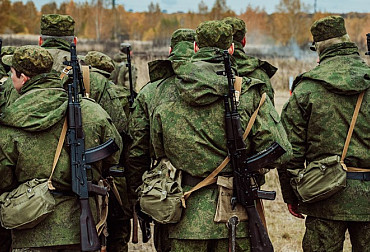Can we assess the severity of threats and risks?
It is not always possible to predict the outcome or duration of a conflict. In most cases, this is due to a lack of relevant information. Another factor may be the unexpected length of the conflict, and therefore the greater or lesser unpreparedness of the actors to deal with the demands of continued combat activity. The importance of a high quality and sufficiently robust logistical support, which is part of the military capability, is also becoming increasingly apparent. Particularly in a protracted conflict, the ability to secure high levels of material requirements will play an important role. This can be covered for the war effort both on the basis of war production, i.e. the performance of its own economy, and from the supply of military and other necessary material from allied entities. However, the behaviour of supporters may not be predictable throughout the conflict. It is even more complicated to predict the consequences of a conflict, and not only for the enemy countries. Given the level of involvement in a conflict, there may be a new ordering of global relations, including the power position of superpowers or newly formed alliances. In many cases, the unexpected consequences cannot be undone.
In the case of the conflict in Ukraine, it is also appropriate to think about what the world will look like afterwards. Barring the worst-case scenario – the use of nuclear weapons – there is likely to be a shift in geopolitical influence in favour of Asia, particularly China and India, and, as far as the countries of Africa are concerned, a rise in their importance and, for many of them, a change in political and economic orientation. It will therefore be a question, perhaps soon a rhetorical one, of who will be among those who gain more or those who lose more or less.
Often in the shadow of ongoing conflicts, important changes and undesirable developments are taking place without much attention in a number of areas, such as the spread of terrorism, radicalism and organised crime, migration, the collapse of states or 'just' undesirable political and economic orientations. For example, relations between France and Russia have recently deteriorated, not least in the context of the conflict in Ukraine. There has also been a conflict of interest in Syria, where France supported the overthrow of Syrian President Assad. And these deteriorating relations may also have repercussions in Africa, where Russian contractors (Wagnerites) are helping to divert from France. This has already happened in Burkina Faso and Mali, and developments in Niger are currently in play. Perhaps, in the context of the latest developments in the aforementioned states, it is also worth asking what impact the intervention in Libya associated with the removal of Gaddafi has had on these states. However, it is safe to say that the collapse of Libya is having a demonstrable and significant impact on the increase in migration of Africans to Europe.
Not only on developments in the Sahel
It remains to be seen whether some ECOWAS countries will decide to intervene in Niger. Even for a strong Nigeria, this may not be without risk. And it is not just internal problems. China's economic involvement may play a role against armed intervention, as it is investing in economic projects here to exploit local resources and markets. Another important aspect may be Nigeria's expected interest in membership of the BRICS economic grouping (Brazil, Russia, India, China and South Africa). However, this will not be possible without the support of some existing members. In the context of China's economic expansion so far, it can be expected that it will therefore probably be mainly China's support. In the case of the African continent, Egypt and Ethiopia (in addition to the non-African countries - Saudi Arabia, Iran, Argentina, the United Arab Emirates) will become new BRICS members as of 1 January 2024. Given the economic and geopolitical interests of China and Russia in the region, it will probably not be easy for Nigeria to decide whether to send its troops to Niger. Probably no less important than developments in Niger will be the future orientation of Nigeria, which is already Africa's largest economy.
The destabilisation of other African states cannot be ruled out in the near future. And it is still a question of what role the Wagnerites will play here, in addition to internal problems and historical injustices, as instructed by Russia. Africa may thus become a strong card for Russia in a complex geopolitical game, including the ongoing conflict in Ukraine. Thus, the recent statement by the US President that the consequences of the war in Ukraine extend far beyond Europe may also apply to Africa. Nor should we forget the results and subsequent impact of interventions in Libya, Iraq, Syria and Afghanistan. It is also worrying that the choice is increasingly being made between bad or worse.

Trends in global developments
But above all, from a global perspective, cheaper raw materials supplied from Russia to China and India can be expected to enable the economies of these countries to develop even faster, including strengthening their geopolitical position. As for China, it has recently made unexpected gains in the Middle East. These include, in particular, the negotiation of a 25-year strategic cooperation agreement with Iran (2021) and the brokering of an agreement to restore diplomatic relations between Iran and Saudi Arabia (2023). These steps are also linked to the implementation of China's new Silk Road project. According to China, this, its latest major project, is about economic cooperation, but with this comes, as a rule, the acquisition of political influence. We should certainly not forget India, which is experiencing rapid economic growth, despite the economic problems in the world. The interest of a growing number of countries in joining BRICS suggests much for the future direction of global development. Other interested countries such as Turkey, Indonesia and Mexico are expected to be among the next entrants. The decision on which countries will be further expanded by BRICS will probably be made during the next summit, which should take place in Kazan, Russia, in October 2024. It cannot be ruled out that the new members will include the aforementioned Nigeria.




















